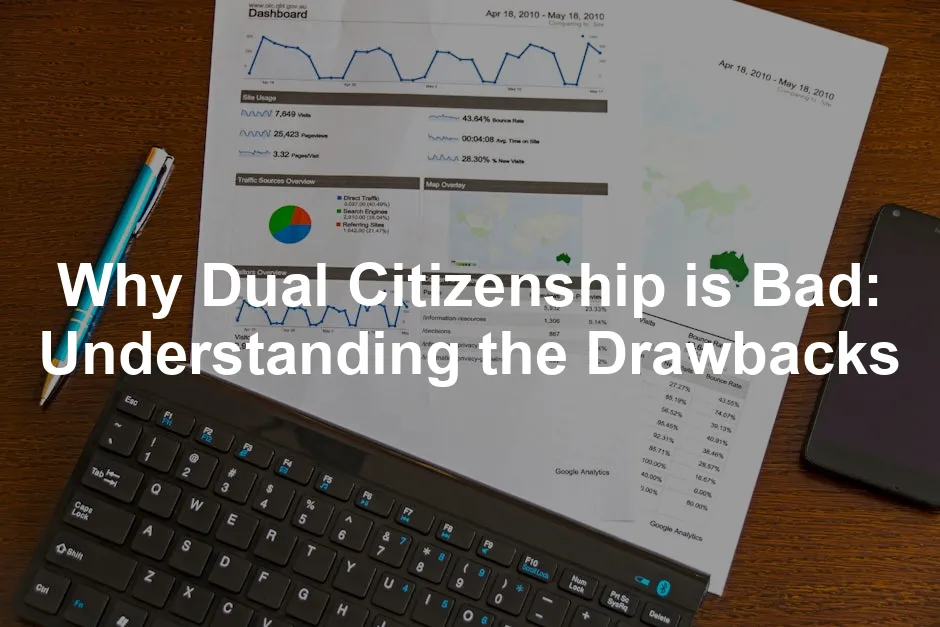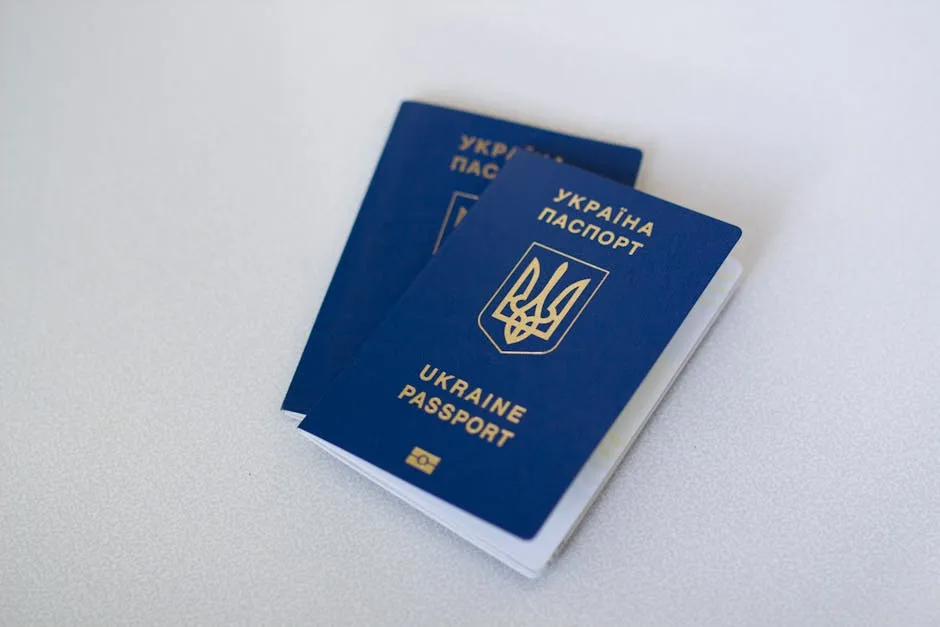
Why Dual Citizenship is Bad: Understanding the Drawbacks
Introduction
Dual citizenship means holding citizenship in two countries. It’s becoming increasingly common as globalization expands. This article will focus on the negative aspects of dual citizenship. While there are benefits, the drawbacks deserve serious attention. Understanding these can help you make informed decisions about your citizenship options.
Speaking of making informed decisions, if you’re looking for a comprehensive understanding of dual citizenship, check out Dual Citizenship: A Global Perspective. This book dives deep into the nuances of holding citizenship in multiple countries.
Summary and Overview
Dual citizenship, or dual nationality, allows individuals to be citizens of two countries simultaneously. Each country recognizes the rights and responsibilities of its citizens. This concept is gaining traction globally, with many nations accepting dual status. In fact, around 75% of countries now allow dual citizenship in some form. However, it’s essential to discuss the downsides, as the complications can be significant. Key arguments against dual citizenship include conflicting loyalties, legal complexities, and potential taxation issues. Let’s take a closer look at these crucial points.
If you’re traveling or living abroad, a Travel Adapter for International Use is a must-have! It ensures your devices stay charged no matter where you are in the world, making it easier to navigate your dual citizenship journey.

The Drawbacks of Dual Citizenship
Conflicting Loyalties
Holding citizenship in two countries can create challenging situations. When conflicts arise, dual citizens might find themselves torn between allegiances. Historical cases, such as during World War I, show how divided loyalties can complicate matters. For example, dual nationals faced scrutiny for their conflicting identities during wartime.
National security also becomes a concern. Governments worry that dual citizens may not fully support one nation over another. Statistics indicate that over 15% of conflicts involve dual nationals, raising alarms about potential risks. This situation prompts us to ask: how do we define national loyalty today?
It’s essential to consider your own views on allegiance. Would you feel equally committed to both countries during a crisis? The implications of divided loyalties are significant and deserve thoughtful reflection.

If you’re feeling the stress of navigating multiple identities, consider using Essential Oils for Relaxation. They can help soothe the mind and body, making it easier to cope with the pressures of dual citizenship.
Legal Complications
Dual citizenship introduces a maze of legal challenges. Each country has different laws governing citizenship obligations. For example, taxation rules can overlap, leading to potential double taxation. This situation creates confusion for individuals trying to manage their financial responsibilities.
Military service is another area where complications arise. Some countries require military duty, and dual citizens may face conflicting obligations. Imagine being called to serve in both nations—how would you choose? Legal disputes can also emerge if one country mandates actions that conflict with the laws of the other.
As you consider dual citizenship, think about the legal implications it may carry. Can you navigate the complexities of obligations in two different legal systems? Understanding these nuances is vital for anyone exploring dual citizenship.

For those who want to be well-prepared, a Guide to International Law can provide valuable insights into the intersection of citizenship and legal obligations.
Taxation Issues
Dual citizenship can lead to significant tax challenges. When you hold citizenship in two countries, you may face tax obligations in both jurisdictions. This situation often results in potential double taxation, creating a financial burden. Countries like the United States tax citizens on worldwide income. If your second nation does not have a tax treaty with the U.S., you might end up paying taxes twice on the same income.
Currently, around 60 countries have double taxation agreements in place. These treaties are designed to prevent individuals from being taxed by both nations on the same earnings. Without such agreements, navigating tax obligations becomes complex. Consequently, dual citizens must stay informed about tax laws in both countries to avoid unexpected liabilities. Consulting a tax advisor is highly recommended for anyone considering dual citizenship. They can provide guidance on potential tax implications and help you make informed decisions.

If you’re considering the financial implications, don’t miss out on Tax Strategies for Dual Citizens. This book outlines effective methods to manage your tax responsibilities and avoid pitfalls.
Military Obligations
Military obligations present another concern for dual citizens. Some countries require mandatory military service, and dual citizens may find themselves subject to these requirements in both nations. Countries like South Korea and Israel impose military duties on their citizens, regardless of where they reside. If called upon, dual nationals could face a dilemma about which country’s service to fulfill.
Historically, dual citizens have grappled with conflicting military obligations. During World War I, for instance, some dual nationals were drafted by both nations, leading to complex legal challenges. The implications of serving in two militaries can be significant, potentially affecting citizenship status. If you are considering dual citizenship, it’s crucial to evaluate each country’s military service requirements. Understanding these obligations can help you navigate the complexities of military duties and their impact on your citizenship status.

Traveling frequently? A Portable Phone Charger can be a lifesaver, ensuring your devices are always ready to go, whether you’re attending to military obligations or exploring your dual citizenship options.
Career Limitations
Dual citizenship can limit career opportunities, particularly in government roles. Many nations impose strict regulations on dual citizens when it comes to sensitive positions. For example, individuals seeking employment in intelligence agencies or military roles often face restrictions. These positions typically require a high level of security clearance.
Security clearances assess an individual’s loyalty and reliability. Dual citizenship can raise questions about divided loyalties, leading to potential disqualification. Without the ability to obtain necessary clearances, dual citizens might miss out on valuable career paths.
Consider the implications on your career goals. Are there positions you’re interested in that may be affected by your citizenship status? Reflecting on your aspirations can help clarify whether dual citizenship aligns with your professional ambitions.

To stay organized while job hunting or managing your career, consider investing in a Home Office Desk Organizer. It can help you keep all your important documents in one place as you navigate the complexities of your career.
Cultural Identity Conflicts
Navigating two cultures can lead to a complex identity for dual citizens. Many individuals experience cultural identity crises, feeling pressure from both societies. Each culture may have distinct expectations regarding behavior, traditions, and values. This can create an internal struggle for those trying to assimilate fully.
For example, a dual citizen may feel torn between the customs of their birth country and those of their new home. This conflict can lead to feelings of alienation or confusion about one’s identity. The pressure to conform to both cultures can be overwhelming, leading to anxiety and stress.
Have you faced challenges in balancing different cultural identities? Sharing your experiences can help others understand the complexities of biculturalism.

To help you document your journey and reflections, consider using a Travel Journal. It can serve as a therapeutic outlet for your thoughts as you navigate your dual identity.
Conclusion
In this article, we discussed several drawbacks of dual citizenship. While it can provide opportunities, the complications shouldn’t be ignored. Conflicting loyalties, legal issues, and taxation troubles can create significant challenges for dual nationals. It’s crucial to weigh these pros and cons thoughtfully. If you’re considering dual citizenship, reflect on the implications for your life. What are your thoughts on this topic? Please share your views in the comments below or pass this article along to others who might find it helpful.

To enhance your understanding of cultural conflicts, you might want to check out The Identity Crisis: Navigating Cultural Conflicts. This book can provide deeper insights into the challenges faced by dual citizens.
FAQs
What are the main legal issues faced by dual citizens?
Dual citizens often encounter legal complications related to conflicting laws between their countries. These can include issues with taxation, military obligations, and inheritance laws. It’s vital to understand your legal standing in each country before pursuing dual citizenship.
Can dual citizens vote in both countries?
Yes, in most cases, dual citizens can vote in elections in both countries. However, they must comply with the voting laws and regulations of each nation, which may vary.
What happens if one country goes to war with the other?
Dual citizens may face severe dilemmas during wartime, as conflicting loyalties can create a situation where they must choose sides. This can lead to legal and personal complications.
Are there countries that do not allow dual citizenship?
Yes, several countries, like India and China, have strict laws against dual citizenship. Individuals in these countries must renounce their original citizenship if they acquire a new one.
How does dual citizenship affect inheritance laws?
Dual citizenship can complicate inheritance matters. Different countries have varying laws regarding asset distribution, which can lead to disputes among heirs.
What are the potential social implications of dual citizenship?
Social acceptance can vary for dual citizens. They may face identity challenges or feel pressure to conform to the cultural expectations of both countries.
Can dual citizens lose their citizenship?
Yes, dual citizens can lose their citizenship if they violate specific laws or obligations in either country. This may include failing to meet tax requirements or engaging in actions deemed unacceptable by either nation.
Please let us know what you think about our content by leaving a comment down below!
Thank you for reading till here 🙂
For a deeper understanding of the implications of dual citizenship, consider exploring the reasons why dual citizenship is often viewed negatively.
All images from Pexels




